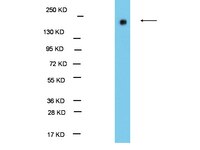Profiling genome-wide chromatin methylation with engineered posttranslation apparatus within living cells.
Wang, R; Islam, K; Liu, Y; Zheng, W; Tang, H; Lailler, N; Blum, G; Deng, H; Luo, M
Journal of the American Chemical Society
135
1048-56
2013
Mostra il sommario
Protein methyltransferases (PMTs) have emerged as important epigenetic regulators in myriad biological processes in both normal physiology and disease conditions. However, elucidating PMT-regulated epigenetic processes has been hampered by ambiguous knowledge about in vivo activities of individual PMTs particularly because of their overlapping but nonredundant functions. To address limitations of conventional approaches in mapping chromatin modification of specific PMTs, we have engineered the chromatin-modifying apparatus and formulated a novel technology, termed clickable chromatin enrichment with parallel DNA sequencing (CliEn-seq), to probe genome-wide chromatin modification within living cells. The three-step approach of CliEn-seq involves in vivo synthesis of S-adenosyl-L-methionine (SAM) analogues from cell-permeable methionine analogues by engineered SAM synthetase (methionine adenosyltransferase or MAT), in situ chromatin modification by engineered PMTs, subsequent enrichment and sequencing of the uniquely modified chromatins. Given critical roles of the chromatin-modifying enzymes in epigenetics and structural similarity among many PMTs, we envision that the CliEn-seq technology is generally applicable in deciphering chromatin methylation events of individual PMTs in diverse biological settings. | Immunoprecipitation | 23244065
 |
Lysine methylation of the NF-κB subunit RelA by SETD6 couples activity of the histone methyltransferase GLP at chromatin to tonic repression of NF-κB signaling.
Levy, D; Kuo, AJ; Chang, Y; Schaefer, U; Kitson, C; Cheung, P; Espejo, A; Zee, BM; Liu, CL; Tangsombatvisit, S; Tennen, RI; Kuo, AY; Tanjing, S; Cheung, R; Chua, KF; Utz, PJ; Shi, X; Prinjha, RK; Lee, K; Garcia, BA; Bedford, MT; Tarakhovsky, A; Cheng, X; Gozani, O
Nature immunology
12
29-36
2010
Mostra il sommario
Signaling via the methylation of lysine residues in proteins has been linked to diverse biological and disease processes, yet the catalytic activity and substrate specificity of many human protein lysine methyltransferases (PKMTs) are unknown. We screened over 40 candidate PKMTs and identified SETD6 as a methyltransferase that monomethylated chromatin-associated transcription factor NF-κB subunit RelA at Lys310 (RelAK310me1). SETD6-mediated methylation rendered RelA inert and attenuated RelA-driven transcriptional programs, including inflammatory responses in primary immune cells. RelAK310me1 was recognized by the ankryin repeat of the histone methyltransferase GLP, which under basal conditions promoted a repressed chromatin state at RelA target genes through GLP-mediated methylation of histone H3 Lys9 (H3K9). NF-κB-activation-linked phosphorylation of RelA at Ser311 by protein kinase C-ζ (PKC-ζ) blocked the binding of GLP to RelAK310me1 and relieved repression of the target gene. Our findings establish a previously uncharacterized mechanism by which chromatin signaling regulates inflammation programs. | | 21131967
 |









